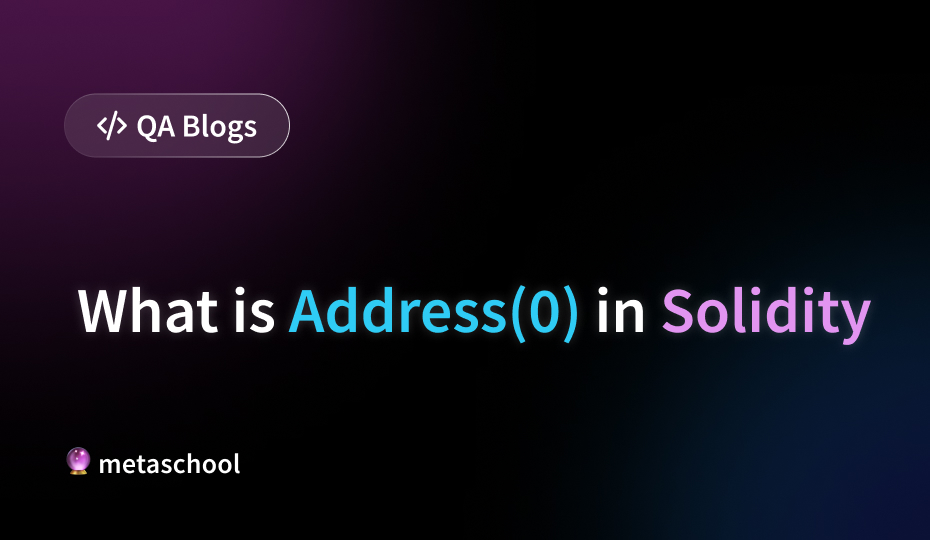Table of Contents
Address(0) in Solidity serves as a pivotal concept within Ethereum smart contracts, embodying a unique role and significance in the Ethereum ecosystem. Let’s delve into the intricacies of Address(0), exploring its functionalities, applications, and limitations.
Understanding address(0) in Solidity
Address(0), also known as the zero address or null address, embodies a distinct Ethereum address:
0x0000000000000000000000000000000000000000This address holds a distinctive status within the Ethereum ecosystem, signifying a null address with all its bytes set to zero. This special address possesses no Ether balance and is incapable of sending or receiving transactions.
🔥 Check this course out: Build a One Piece Personality dApp With Solidity
The significance of address(0)
Address(0) finds utility across various scenarios within Ethereum smart contracts, each contributing to its significance:
1. Default value for uninitialized variables
In Solidity, uninitialized variables of type address are automatically assigned the value of Address(0). This default assignment mirrors the behavior of uninitialized variables in traditional programming languages, which often default to zero or null values.
For instance, consider a scenario where I define a variable myAddress of type address:
address public myAddress;
function setMyAddress(address _newAddress) public {
myAddress = _newAddress;
}If I call the setMyAddress function without providing a value for _newAddress, myAddress will implicitly be set to Address(0).
2. Sentinel value for checking validity
Address(0) serves as a sentinel value for verifying the validity of Ethereum addresses within smart contracts. It is often employed to denote an uninitialized or vacant state, enabling developers to implement robust error-checking mechanisms.
For example, consider a function transfer responsible for transferring tokens:
mapping(address => uint) public balances;
function transfer(address _to, uint _amount) public {
require(balances[msg.sender] >= _amount, "Insufficient balance");
require(_to != address(0), "Invalid recipient address");
// Transfer logic
}In this function, I utilize Address(0) to ensure that the recipient address is valid before proceeding with the token transfer operation.
3. Special handling in contract interactions
During interactions with external contracts, Address(0) assumes a special role in signaling error conditions or exceptional scenarios. Functions returning address types may utilize Address(0) to signify an unsuccessful operation or the absence of a valid address.
interface IToken {
function transfer(address recipient, uint amount) external returns (bool);
}
function transferTokens(address _tokenAddress, address _recipient, uint _amount) public {
IToken token = IToken(_tokenAddress);
require(token.transfer(_recipient, _amount), "Token transfer failed");
// Additional logic
}In this example, a failed transfer operation from the token contract to Address(0) may trigger an appropriate error message or handling mechanism.
🔥 Check this course out: Build a Semi-Fungible ERC404 Tokens’ Marketplace
Address(0) in Ethereum ecosystem
Address(0) carries a distinctive role and significance in the Ethereum ecosystem, embodying the absence or null state within smart contracts. Its utilization spans across various aspects of contract development and interaction, contributing to the reliability and robustness of Ethereum-based applications.
Conclusion
In conclusion, Address(0) in Solidity represents a foundational element within Ethereum smart contracts, symbolizing absence or nullity in the Ethereum address space. Its versatile applications, ranging from default variable initialization to error handling in contract interactions, underscore its importance in the development of secure and reliable smart contracts. Understanding the nuances of Address(0) is essential for proficiently navigating the complexities of Ethereum contract development, ensuring the creation of resilient and error-tolerant decentralized applications.
Try it out, ask us questions, and tell us how it went by tagging Metaschool on Social Media.
Follow us on –
🔮Twitter – https://twitter.com/0xmetaschool
🔗LinkedIn – https://www.linkedin.com/company/0xmetaschool/
